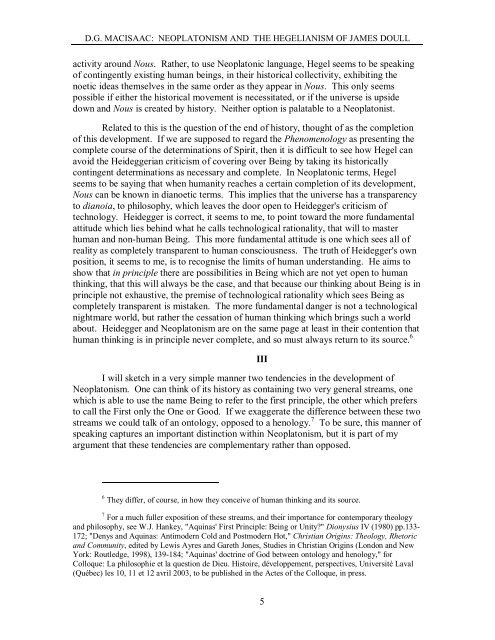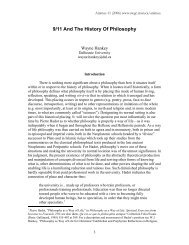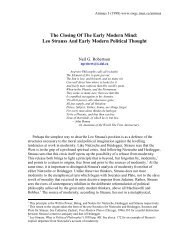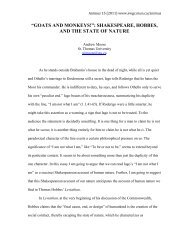Neoplatonism And The Hegelianism Of James Doull1
Neoplatonism And The Hegelianism Of James Doull1
Neoplatonism And The Hegelianism Of James Doull1
You also want an ePaper? Increase the reach of your titles
YUMPU automatically turns print PDFs into web optimized ePapers that Google loves.
D.G. MACISAAC: NEOPLATONISM AND THE HEGELIANISM OF JAMES DOULLactivity around Nous. Rather, to use Neoplatonic language, Hegel seems to be speakingof contingently existing human beings, in their historical collectivity, exhibiting thenoetic ideas themselves in the same order as they appear in Nous. This only seemspossible if either the historical movement is necessitated, or if the universe is upsidedown and Nous is created by history. Neither option is palatable to a Neoplatonist.Related to this is the question of the end of history, thought of as the completionof this development. If we are supposed to regard the Phenomenology as presenting thecomplete course of the determinations of Spirit, then it is difficult to see how Hegel canavoid the Heideggerian criticism of covering over Being by taking its historicallycontingent determinations as necessary and complete. In Neoplatonic terms, Hegelseems to be saying that when humanity reaches a certain completion of its development,Nous can be known in dianoetic terms. This implies that the universe has a transparencyto dianoia, to philosophy, which leaves the door open to Heidegger's criticism oftechnology. Heidegger is correct, it seems to me, to point toward the more fundamentalattitude which lies behind what he calls technological rationality, that will to masterhuman and non-human Being. This more fundamental attitude is one which sees all ofreality as completely transparent to human consciousness. <strong>The</strong> truth of Heidegger's ownposition, it seems to me, is to recognise the limits of human understanding. He aims toshow that in principle there are possibilities in Being which are not yet open to humanthinking, that this will always be the case, and that because our thinking about Being is inprinciple not exhaustive, the premise of technological rationality which sees Being ascompletely transparent is mistaken. <strong>The</strong> more fundamental danger is not a technologicalnightmare world, but rather the cessation of human thinking which brings such a worldabout. Heidegger and <strong>Neoplatonism</strong> are on the same page at least in their contention thathuman thinking is in principle never complete, and so must always return to its source. 6I will sketch in a very simple manner two tendencies in the development of<strong>Neoplatonism</strong>. One can think of its history as containing two very general streams, onewhich is able to use the name Being to refer to the first principle, the other which prefersto call the First only the One or Good. If we exaggerate the difference between these twostreams we could talk of an ontology, opposed to a henology. 7 To be sure, this manner ofspeaking captures an important distinction within <strong>Neoplatonism</strong>, but it is part of myargument that these tendencies are complementary rather than opposed.III6 <strong>The</strong>y differ, of course, in how they conceive of human thinking and its source.7 For a much fuller exposition of these streams, and their importance for contemporary theologyand philosophy, see W.J. Hankey, "Aquinas' First Principle: Being or Unity?" Dionysius IV (1980) pp.133-172; "Denys and Aquinas: Antimodern Cold and Postmodern Hot," Christian Origins: <strong>The</strong>ology, Rhetoricand Community, edited by Lewis Ayres and Gareth Jones, Studies in Christian Origins (London and NewYork: Routledge, 1998), 139-184; "Aquinas' doctrine of God between ontology and henology," forColloque: La philosophie et la question de Dieu. Histoire, développement, perspectives, Université Laval(Québec) les 10, 11 et 12 avril 2003, to be published in the Actes of the Colloque, in press.5
















